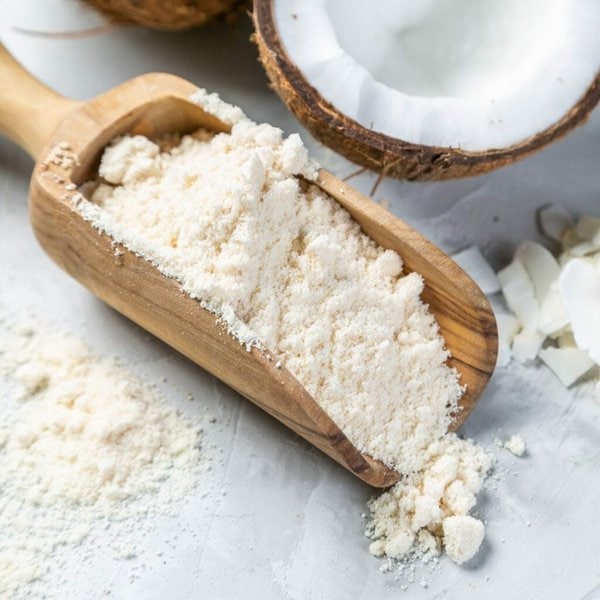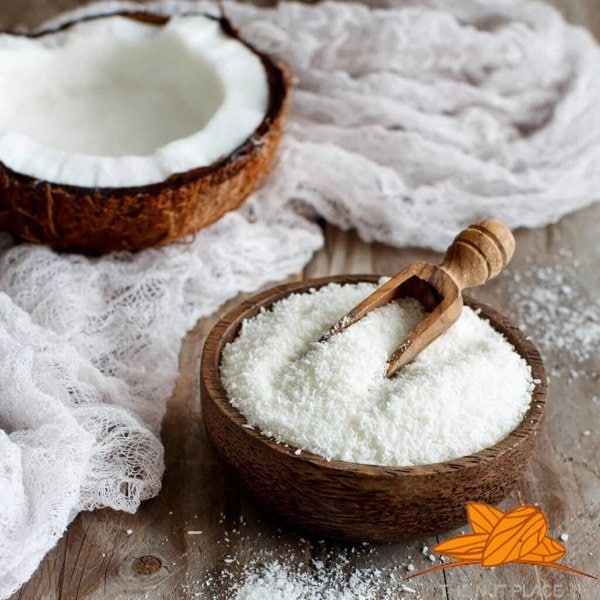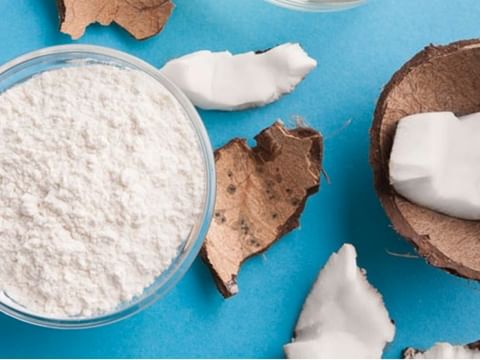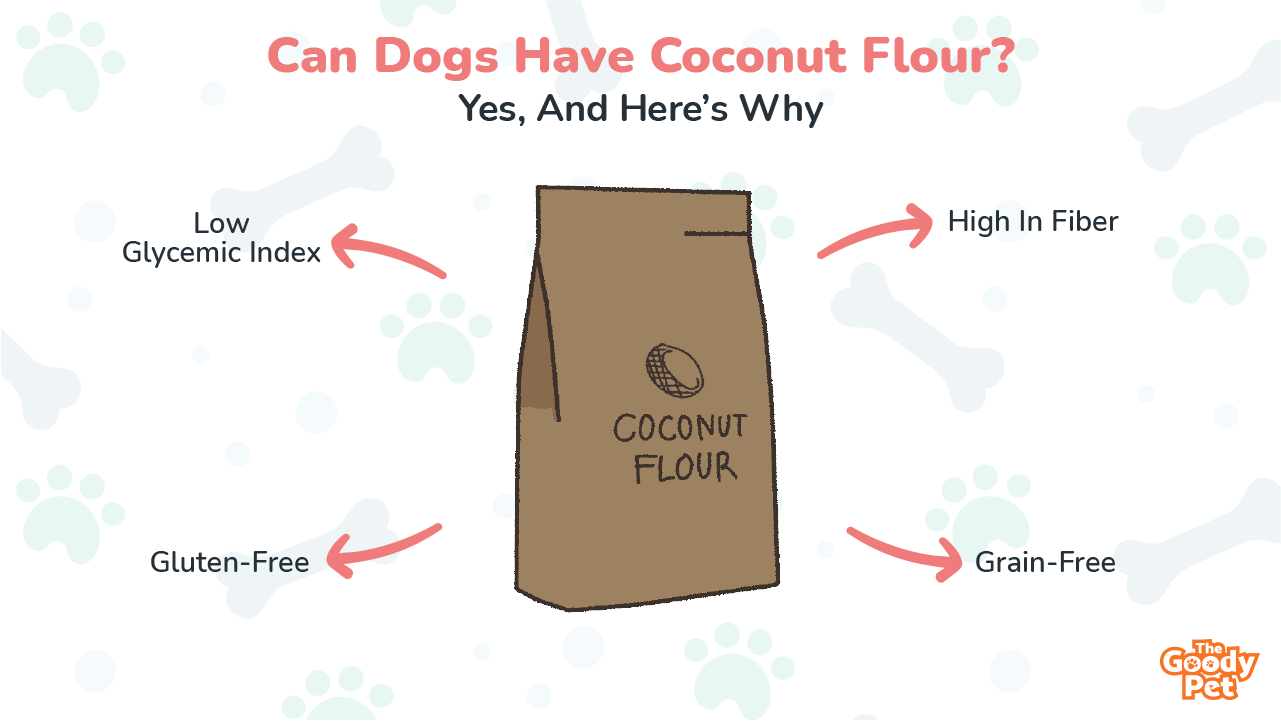Many people are scared to offer baked treats to their dogs, thinking it would cause more harm than good. Those who opt to make homemade baked treats for their dogs will often use the common white flour as the base ingredient. A question flipped through my mind—can dogs have coconut flour?
Yes, coconut flour is perfectly safe and an excellent choice of treat for dogs. It is beneficial for dogs because it is a gluten-free alternative to white flour and is high in both fiber and protein. Coconut flour should be fed in moderation as some dogs may find it hard to digest.
One of the beneficial reasons for giving coconut flour to your dog is that it contains high fiber content, which aids the digestion of food. Continue reading this article to know more about the benefits of coconut flour for dogs.
Before discussing the benefits of coconut flour, let’s consider if it’s safe to give dogs coconut flour.
Is Coconut Flour Poisonous To Dogs?

No, coconut flour is not poisonous to dogs. A large number of dogs enjoy treats made with coconut flour. It’s a popular choice among dog owners because it’s gluten-free.
Coconut flour is quite versatile, as it can be used in baking dog treats like cookies and biscuits.
What sets coconut flour apart from other types of flour is its low glycemic index. With a low glycemic index rating, diabetic dogs can consume coconut flour in moderation without any problem.
When preparing homemade treats for your dog, make sure you do not mix coconut flour with other ingredients that are toxic to your canine.
Are Dogs Allergic To Coconut Flour?
A large number of dogs are not allergic to coconut flour since it is gluten-free. But signs of allergic reactions to coconut flour include abdominal upset and bloating.
Although coconut flour doesn’t contain gluten, evidence points to the fact that it contains medium-chain triglycerides. This can cause bloating and bellyache for your canine.
If your doggie experiences the symptoms mentioned above, do not hesitate to contact your veterinarian immediately.
If you’ve never given food made with coconut flour to your dog, contact your vet before introducing such foods to your canine for the first time.
Is Coconut Flour Grain-free?
Yes, it is. Coconut flour is a high fiber gluten-free, grain-free flour that’s an excellent baking product for your dog’s keto diet.
Coconut flour is made from coconut that has been dried and ground to powder. Most times, coconut flour is usually combined with almond flour to add texture to baked dog treats.
If your veterinarian has placed your dog on a low-carb diet, coconut flour is an excellent choice of food for your dog.
Coconut flour contains 2 grams of net carbs per serving compared to 23 grams of net carbs for all-purpose flour.
Is It Safe For Dogs To Eat Raw Flour?
Raw flour can cause serious allergies for your dog. Don’t add flour to your dog’s diet. Avoid it if you can, or make sure your dog is consuming healthy flour.
It is safe to sometimes give your dog baked food, but it’s not a good idea to give raw flour to your dog directly from the bag.
A dog that consumes raw flour is likely to make your dog seriously sick. If your dog accidentally consumes raw flour, keep an eye on it for any serious side effects.
Dogs intolerant to gluten experience symptoms ranging from gas, cramps, diarrhea, gut damage, and nutrient malabsorption.
Dogs who are sensitive to gluten will often experience the side effects mentioned above.
If your dog is gluten sensitive, you should not be feeding your dog with raw flour and should eliminate it from your dog’s diet.
What Are The Side Effects Of Coconut Flour?

Coconuts contain a high amount of saturated fat called medium-chain triglycerides.
These fats work differently than other types of saturated fat. They cause increased fat burning and reduce fat storage for your dog.
Unfortunately, feeding your dog with too much coconut flour may lead to rapid weight gain and risks of obesity. Moreover, it can lead to additional issues concerning obesity, such as lethargy and lower activity levels.
How Is Coconut Flour Different From Regular Flour?
Coconut flour is denser in many nutrients than traditional grain-based flour. Coconut flour is fairly high in protein, fiber, and fat. It’s also low in carbohydrates by comparison to other flours.
One thing that distinguishes coconut flour from other regular flours is its absorbent nature. A small amount of coconut flour would absorb a large quantity of water.
Coconut flour has a tremendous effect on baked treats. If you plan on using coconut flour to make your dog treats, counteract the drying effect by using a lot of eggs when baking.
While coconut flour is dense in protein, fiber, fat, and many micronutrients, it is also rich in salicylates. Some dogs react adversely to this. Always keep an eye on your canine after giving it coconut flour.
Can Diabetic Dogs Have Coconut Flour?
Coconut flour is rich in dietary fiber, which can help reduce the risk of developing heart disease and lower cholesterol levels in dogs.
Coconut flour is quite useful for diabetic dogs because it has little to no impact on your dog’s blood glucose.
Coconut flour is also a good source of protein, which keeps diabetic dogs full for longer when compared to carbs. If you are giving your diabetic canine coconut flour, do it in moderation.
Can Dogs Digest Coconut Flour?
The heavy fiber content of coconut flour makes it difficult for some dogs to digest. Some dogs can’t even tolerate a small amount of coconut flour.
Coconut flour is definitely one of the healthiest and safest flours you can give to your canine. Some canines find it easy to digest, while some can’t tolerate it.
Always keep an eye on your canine after giving it coconut flour. If there are any strange symptoms, contact your vet.
What Are The Benefits Of Coconut Flour For My Dog?
Coconut flour is extremely dense with nutrients. It is a good source of protein and iron. It is “low-carb,” giving it a low glycemic index.
Coconut flour contains more protein per serving than other popular flour without gluten, making it a wonderful supplement for your canine.
Dog treats made of coconut flour have a lower calorie count compared to those made with grain-based flour. This makes coconut flour perfect for canines on a modified diet.
Coconut flour is also rich in lauric acid. Lauric acid has anti-inflammatory properties and helps speed up the healing of wounds or aching joints.

Protein
Two teaspoons of coconut flour contain 2 grams of protein. This makes protein a major constituent of coconut flour.
Protein found in coconut flour helps in the supply of amino acids to build the skin, hair, muscle, ligament, and tendon of your canine.
Iron
Iron is the primary mineral present in coconut flour, making it a good option for people on vegan diets who are concerned about getting enough iron.
Iron is a mineral that is required by your dog’s body to perform important functions like carrying oxygen in the hemoglobin of red blood cells throughout the body.
If your dog is iron deficient, it will be weak, lethargic, and more prone to diseases and illnesses.
Fiber
Coconut flour is high in fiber. Food high in fiber promotes good digestion and the growth of healthy bacteria in your dog’s gut. This helps keep bowel movements regular and protects against illnesses.
The high amounts of fiber in coconut flour can help your pup feel fuller longer, increase its energy levels, and decrease its appetite. Dogs who are obese experience these effects on an even greater level when eating more fiber.
Low Glycemic Index
Coconut flour has a lower glycemic index compared to regular wheat flour. A lower glycemic index means it takes a longer time for a dog’s system to absorb and digest the carbs in it.
When coconut flour is used in making dog treats, it helps control blood sugar spikes in dogs.
If you are interested in knowing how to calculate the glycemic index of your dog’s food, multiply the grams of available carbohydrate in the food by the food’s glycemic index and then divide by 100.





